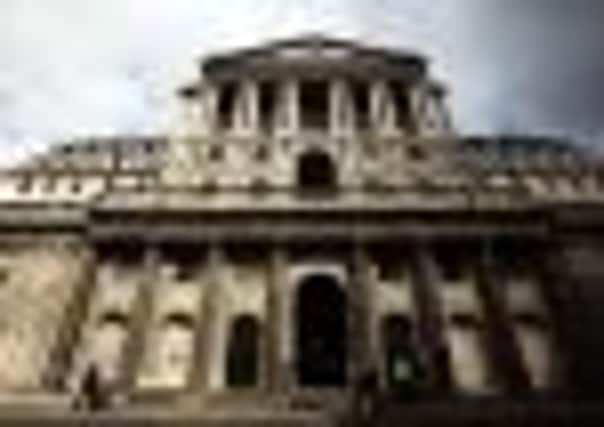Bank of England holds back on further quantitative easing as interest rate held at 0.5%


• Interest rates held at historic low of 0.5%
• Quantitave easing held at £375bn
• Manufacturing showing signs of recovery
• Bank of England expects inflation to fall back to 2% by the end of the year
The Bank’s Monetary Policy Committee today maintained interest rates at record lows of 0.5 per cent and held its quantitative easing (QE) programme at £375 billion as it continues to work through £50 billion of asset purchases announced in July.
Advertisement
Hide AdAdvertisement
Hide AdThe move comes after positive manufacturing and services surveys revealed tentative signs of a recovery - but this optimism was dampened after the Organisation for Economic Co-operation and Development slashed its growth forecast for 2012.
The think-tank expects the UK will fail to pull out of its double-dip recession in the current quarter, which will see a 0.7 per cent decline on an annualised rate, compared to previous expectations of a 0.5 per cent decline.
Most economists have predicted a further QE boost in November, after the current run of asset purchases is completed, while some believe a rate cut is on the cards.
Anna Leach, CBI head of economic analysis, said: “We would need only a relatively small deterioration in economic conditions to prompt a further extension of the asset purchase programme later this year.”
The Bank also recently admitted that QE has increased the fortunes of the wealthiest 5 per cent of Britons while eroding the value of many pension funds.
Ros Altmann, director-general of Saga, said the Bank was wrong to suggest that pensioners have not lost out and said QE was causing “significant economic damage”.
Aside from recent surveys, there has been little change in the economic outlook since the MPC’s last meeting, although SSE’s 9 per cent hike in energy bills from next month and the impact of US drought on food prices have threatened the inflation outlook.
INFLATION
The Bank currently expects the rate of inflation - which increased to 2.6 per cent in July - to fall to the government’s 2 per cent target by the end of this year.
Advertisement
Hide AdAdvertisement
Hide AdGovernor Sir Mervyn King and his colleagues will also want more time to assess the impact of the UK’s £80 billion “funding for lending” scheme, which was launched in the summer with the aim of unclogging the flow of credit.
The committee has also considered cutting rates below the current level of 0.5 per cent - a move that once seemed improbable - although the Bank continues to favour QE as its economic weapon of choice.
Today’s meeting was the first for former CBI chief economic adviser Ian McCafferty, who has replaced Adam Posen.
In a report released last month, the Bank said its QE programme has increased total household wealth by 16 per cent, or £600 billion, after increasing the value of assets.
But it is the richest households - holding around 40 per cent of these assets - that have benefited the most, according to the Bank.
The report also found that pension funds with hefty shortfalls will have seen their deficits increased further, but the Bank rejected fears that QE has hurt pensioners.